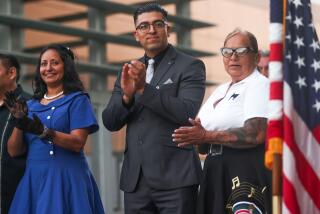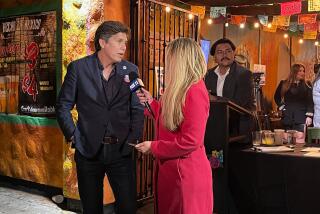Windy City Campaign Blows Hot, Cold
- Share via
CHICAGO — I get to the hotel room and turn on the television and the big story is whether one of the candidates for mayor has called one of his black supporters “Buckwheat.”
And that is when I know I’m really in Chicago.
Politics here has meant racial politics for some time now, but an odd sense of lassitude has fallen over the mayoral campaign.
On April 4 Chicago may become the first major city to return to a white mayor after electing a black one. But people here seem tired of the race issue. Racial divisions and fears have been played to by the different candidates so many times that people of all races seem to be sick of it.
They just want the election to be over and done with.
But the “Buckwheat” story is just too sexy for TV to pass up. The station has dramatic videotape of a black former Richard M. Daley supporter accusing Daley of calling a black supporter “Buckwheat” during a luncheon more than a month before.
Why the accuser took a month to get outraged is not explained.
Daley, the son of the late mayor, is the Democratic candidate for mayor. He is running against Timothy Evans, a black alderman running on an independent ticket, and Edward Vrdolyak, a white former chairman of the Cook County Democratic Party who is now running as a Republican. Is that clear?
The man who was allegedly called Buckwheat is Larry Benas, Daley’s coordinator for the West Side of the city. “He never called me Buckwheat,” Benas says, “but Buckwheat is my nickname. It has been my nickname ever since I was a teen-ager and there was the Little Rascals and I did this move on the roof and I got the name Buckwheat. That’s my nickname. But Daley never called me Buckwheat.”
The TV report goes on and on. Various friends of Benas are interviewed as to whether his name is Buckwheat or not.
“This is his nickname,” a friend says. “Everybody calls him that.”
Then a videotape from weeks before is shown of Daley, entering his West Side election office and looking for Benas. “Is Buck here?” Daley asks. “Where’s Buck?”
The reporter explains that Daley said “Buck” and not “Buckwheat.”
“Even my mother calls me Buck,” Benas says later. “It’s my nickname. Rich Daley never called me Buckwheat, though, and I wouldn’t be offended if he did.”
The story does not end here. There are official denials from the Daley campaign. Then the original accuser is brought back to address all the denials.
“I don’t care!” he says. “Rich Daley called a West Side Negro ‘Buckwheat’!”
The story finally ends. There is no particular conclusion. It is just another day in the life of the mayoral campaign.
The next day, I go down to PUSH headquarters on the city’s South Side to hear the Rev. Jesse Jackson deliver his regular Saturday address, as he has done for more than a decade. Timothy Evans is also supposed to be there and the place is packed.
PUSH headquarters is a massive stone building, a former Jewish temple, in a neighborhood of imposing old mansions that sit on large lots surrounded by wrought-iron fences. The main sanctuary inside PUSH has a soaring ceiling held up by towering white pillars. In gold letters above the stage are the words: KNOW BEFORE WHOM THOU STANDEST.
Jackson has been criticized by some Democrats for not supporting the candidate of the Democratic Party, Daley, but instead supporting the black candidate, Evans.
“This campaign is not about black/white, it’s about direction,” Jackson tells the crowd. “This campaign is not about black/white, it’s about good/evil!”
Evans then speaks and points out that Election Day in Chicago will be the anniversary of the death of the Rev. Martin Luther King Jr. “April 4 is a solemn day,” he says. “Dr. King was shot and people asked what will happen to our movement. We saw what happened to our movement, Jesse Jackson stepped forward.
“The question is, are we going to let Daley get in our way and kill our movement!”
Later, asking people to come forward and make contributions, Jackson will raise about $14,000 for the Evans campaign, which lags badly behind Daley, who has raised $5.6 million.
“Make our enemies our footstools,” Jackson says during the closing prayer, “but give us too much grace to make us step on them.”
While this rally ends on the South Side, on the Southwest Side, Edward Vrdolyak holds a rally to sponsor legislation to ban birth-control information and devices in the schools.
Later, Rich Daley is asked to comment on this. “That will not be the campaign,” he says, “whether who’s for condoms and who’s against condoms in this campaign.”
Except for the fact that he never would have used the word condoms in public, the speaking style could be that of Daley’s father.
Later the same day, Art Agnos, who is Greek, comes to Chicago’s Greek Town to endorse Daley.
“Join me in supporting Rich Daley for mayor of San Francisco!” Agnos says.
It is pointed out to Agnos that Rich Daley does not want to be mayor of San Francisco. It is pointed out to Agnos that he, Agnos, is the mayor of San Francisco.
But he should not be embarrassed. He should adopt the policy of the late Richard J. Daley who said: “Quote what I mean, not what I say.”
In Chicago, this is always a good idea.
More to Read
Get the L.A. Times Politics newsletter
Deeply reported insights into legislation, politics and policy from Sacramento, Washington and beyond. In your inbox twice per week.
You may occasionally receive promotional content from the Los Angeles Times.










